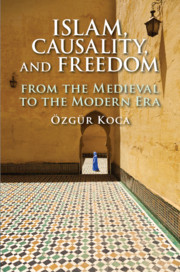Book contents
- Islam, Causality, and Freedom
- Islam, Causality, and Freedom
- Copyright page
- Dedication
- Contents
- Conventions
- Acknowledgments
- Introduction
- 1 Causality in the Early Period
- 2 Toward a Synthesis of Aristotelian and Neoplatonic Understandings of Causality
- 3 Occasionalism in the Middle Period
- 4 The First as Pure Act and Causality
- 5 Light, Existence, and Causality
- 6 The World as a Theophany and Causality
- 7 Continuities and Developments in Sufi Metaphysics
- 8 Toward an Occasionalist Philosophy of Science
- 9 Causality and Freedom in Later Islamic Philosophy
- 10 Occasionalism in the Modern Context
- 11 Islamic Theories of Causality in the Modern Context
- Conclusion
- Bibliography
- Index
6 - The World as a Theophany and Causality
Sufi Metaphysics and the Case of Ibn ʿArabī
Published online by Cambridge University Press: 14 May 2020
- Islam, Causality, and Freedom
- Islam, Causality, and Freedom
- Copyright page
- Dedication
- Contents
- Conventions
- Acknowledgments
- Introduction
- 1 Causality in the Early Period
- 2 Toward a Synthesis of Aristotelian and Neoplatonic Understandings of Causality
- 3 Occasionalism in the Middle Period
- 4 The First as Pure Act and Causality
- 5 Light, Existence, and Causality
- 6 The World as a Theophany and Causality
- 7 Continuities and Developments in Sufi Metaphysics
- 8 Toward an Occasionalist Philosophy of Science
- 9 Causality and Freedom in Later Islamic Philosophy
- 10 Occasionalism in the Modern Context
- 11 Islamic Theories of Causality in the Modern Context
- Conclusion
- Bibliography
- Index
Summary
The sixth chapter offers a way of approaching the question of causality in Ibn ʿArabī’s metaphysical system. Ibn ʿArabī’s metaphysics is relational in the sense that entities are comprehended as the totality of their relationships to God. The divine names are theological categories denoting these relations. It is processual in that it perceives the world as the multiplicity of the incessant and ever-changing manifestations of the divine qualities. The world is recreated anew at each moment and entities are societies of divine acts or theophanies. In this framework, causal power is attributed to God, and causality refers to the regularity and predictability of the related theophanic individualities. The relational and processual qualities of Ibn ʿArabī metaphysics allow him to integrate participatory and occasionalist perspectives on causality. The chapter also examines how Ibn ʿArabī uses the idea of participation and the fixed archetypes (al-aʿyān thābita) to establish freedom.
- Type
- Chapter
- Information
- Islam, Causality, and FreedomFrom the Medieval to the Modern Era, pp. 116 - 134Publisher: Cambridge University PressPrint publication year: 2020

